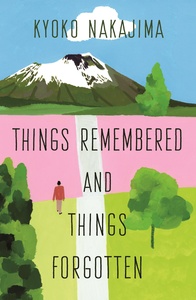Take a photo of a barcode or cover
dark
reflective
medium-paced
Plot or Character Driven:
N/A
Strong character development:
Complicated
Diverse cast of characters:
Yes
Flaws of characters a main focus:
No
emotional
mysterious
reflective
sad
medium-paced
Plot or Character Driven:
Character
Strong character development:
Complicated
Loveable characters:
Yes
Diverse cast of characters:
Yes
Flaws of characters a main focus:
No
dark
emotional
funny
hopeful
inspiring
mysterious
reflective
relaxing
sad
tense
fast-paced
Plot or Character Driven:
A mix
Strong character development:
Yes
Loveable characters:
Complicated
Diverse cast of characters:
Yes
I finally got to finish “Things Remembered and Things Forgotten” by Kyoko Nakajima. I started reading this book last Summer, but something stopped me from finishing it then. Maybe it was because I needed something more punchy and fast paced (I was also reading Last Call by Elon Green and Dangers of Smoking in bed by Mariana Enriques at the time); or perhaps because it just pushed my buttons with the fact that it kept reminding me that I couldn’t be In Tokyo as I was supposed to be because of the pandemic, so I just pushed the book away to be digested another time.
I picked the book up again last week, and I was finally ready to be transported to all those many strange familiar places. Nakajima captures the mix of old and contemporary Japan so beautifully.
Some of the stories take us back and forth from current days to moments of Japan’s past like aftermath of World War II. In fact, a few of the ghost stories follow the World War II theme: an old forties typewriter without a heart is the hook for The Lifestory of A Sewing Machine, which paints a painful world of women trying to survive in a Japan where American Occupation jeeps roar up and down the roads and some have no choice but to work for brothels set up to satisfy the sexual desires of American GIs; the ghosts in The Harajuku House remember the times when buildings were demolished to stop fires from spreading during the American firebombing; And the ghosts of war orphans haunt Ueno Station in Kirara’s Paper Plane. Others, are ghosts of a very different nature like Global Positioning System (GPS) which tells of a mother and their daughters struggle to support a father who appears to be suffering from early onset dementia, and they buy him a phone with GPS, so that they can locate him in case he gets lost in his wanderings.
My favourite is probably the Last Obon, the last story in the book. Obon is a festival about remembrance, and it seems that the main character Satsuki and her family have forgotten even how to remember. Like other short stories, it is peppered with dead characters that appear to the living as real people. Nakajima takes us through a whole Obon ritual, with a Buddhist priest coming in for sermons, with the special dishes that need to be cooked for the celebration, and others that needs to be completely avoided. We learn all about the Obon ritual as the family prepares to remember their ancestors.
“Surveying the little scene around her, it occurred to Satsuki that the belief that the ancestral spirits returned at Obon wasn’t something mystical or paranormal, nor was it a metaphor for human existence—it was an expression of how the dead were resurrected through the gestures and actions of the living in the performance of traditional customs and practices.” At the end I felt that this was what Nakajima was doing with this collection of stories: resurrecting forgotten, almost dead, memories through her storytelling. It is gentle and rich.
I picked the book up again last week, and I was finally ready to be transported to all those many strange familiar places. Nakajima captures the mix of old and contemporary Japan so beautifully.
Some of the stories take us back and forth from current days to moments of Japan’s past like aftermath of World War II. In fact, a few of the ghost stories follow the World War II theme: an old forties typewriter without a heart is the hook for The Lifestory of A Sewing Machine, which paints a painful world of women trying to survive in a Japan where American Occupation jeeps roar up and down the roads and some have no choice but to work for brothels set up to satisfy the sexual desires of American GIs; the ghosts in The Harajuku House remember the times when buildings were demolished to stop fires from spreading during the American firebombing; And the ghosts of war orphans haunt Ueno Station in Kirara’s Paper Plane. Others, are ghosts of a very different nature like Global Positioning System (GPS) which tells of a mother and their daughters struggle to support a father who appears to be suffering from early onset dementia, and they buy him a phone with GPS, so that they can locate him in case he gets lost in his wanderings.
My favourite is probably the Last Obon, the last story in the book. Obon is a festival about remembrance, and it seems that the main character Satsuki and her family have forgotten even how to remember. Like other short stories, it is peppered with dead characters that appear to the living as real people. Nakajima takes us through a whole Obon ritual, with a Buddhist priest coming in for sermons, with the special dishes that need to be cooked for the celebration, and others that needs to be completely avoided. We learn all about the Obon ritual as the family prepares to remember their ancestors.
“Surveying the little scene around her, it occurred to Satsuki that the belief that the ancestral spirits returned at Obon wasn’t something mystical or paranormal, nor was it a metaphor for human existence—it was an expression of how the dead were resurrected through the gestures and actions of the living in the performance of traditional customs and practices.” At the end I felt that this was what Nakajima was doing with this collection of stories: resurrecting forgotten, almost dead, memories through her storytelling. It is gentle and rich.
(2,5 stars)
In theory, I should’ve really liked this book, but either because of the author’s writing style or the translators way of translating, the stories didn’t interest me. Some of the stories played with interesting ideas, but none of them really stood out.
In theory, I should’ve really liked this book, but either because of the author’s writing style or the translators way of translating, the stories didn’t interest me. Some of the stories played with interesting ideas, but none of them really stood out.
First half of the book, which was 4-5 stories was fairly good. By the time I got to the second half, everything started to blend together. The sentiment and cultural depictions were excellent though.
It just sputtered out and there was nothing really gripping me most of the time, spurring me onwards. Some stories were dry enough you weren't quite convinced it was fiction. The writing wasn't over the top, the characters were believable, some nice settings were pictured, but it became the same thing again and again. The author does a good job, but if condensed I might've given this 4 or 5 stars.
I'd still recommend you read the first few stories and call it a day.
It just sputtered out and there was nothing really gripping me most of the time, spurring me onwards. Some stories were dry enough you weren't quite convinced it was fiction. The writing wasn't over the top, the characters were believable, some nice settings were pictured, but it became the same thing again and again. The author does a good job, but if condensed I might've given this 4 or 5 stars.
I'd still recommend you read the first few stories and call it a day.
This is my last piece of Japanese fiction for a bit- I promise! What a choice it was too. This is a collection which I will be lending out to friends. It's powerful, warming and haunting, all in the right measure.
This is a collection of ten short stories set in and around Tokyo, Japan. Each follows a different protagonist through a moment of their life which crosses the boundaries between past and present somehow. There is a theme of spiritual revisiting which flows through the stories, something which I sometimes can't stand in books but felt myself easing into when presented in such a nostalgic way.
The first, eponymous story left me feeling a bit punched in the gut- it was a great way to start the book. I found, like I did reading many of these stories, that I had to pause and reflect before starting the next one.
Each story brought in facets of Japanese history and tradition which linked well with what I saw and experienced during my time in Japan. I loved how the traditions of Obon were explored in light of a changing, modern demographic, as well as how modern characters often walked through life unaware of the history before them. Memories and ghosts acted as powerful means to explore both concepts.
I really recommend this collection, particularly if you would like to or are going to Japan.
This is a collection of ten short stories set in and around Tokyo, Japan. Each follows a different protagonist through a moment of their life which crosses the boundaries between past and present somehow. There is a theme of spiritual revisiting which flows through the stories, something which I sometimes can't stand in books but felt myself easing into when presented in such a nostalgic way.
The first, eponymous story left me feeling a bit punched in the gut- it was a great way to start the book. I found, like I did reading many of these stories, that I had to pause and reflect before starting the next one.
Each story brought in facets of Japanese history and tradition which linked well with what I saw and experienced during my time in Japan. I loved how the traditions of Obon were explored in light of a changing, modern demographic, as well as how modern characters often walked through life unaware of the history before them. Memories and ghosts acted as powerful means to explore both concepts.
I really recommend this collection, particularly if you would like to or are going to Japan.
emotional
reflective
sad
This was such an emotionally moving and wonderful read. Each story surprised me and as a collection, it had me thinking about the thin veil between life and death and the echoes that remain even if a person is no longer with us in body.
Perhaps it’s my issue with Western perspectives versus Japanese sensibilities, but I found the situations repetitive and almost deus ex machina in the author’s use of corporeal ghosts to add the sense of magic realism to generally typical social issues. I admit it could be my problem and not the author’s. The style was accessible and light (a thumb’s up to the translators). A quick read with interesting access to Japanese culture.








